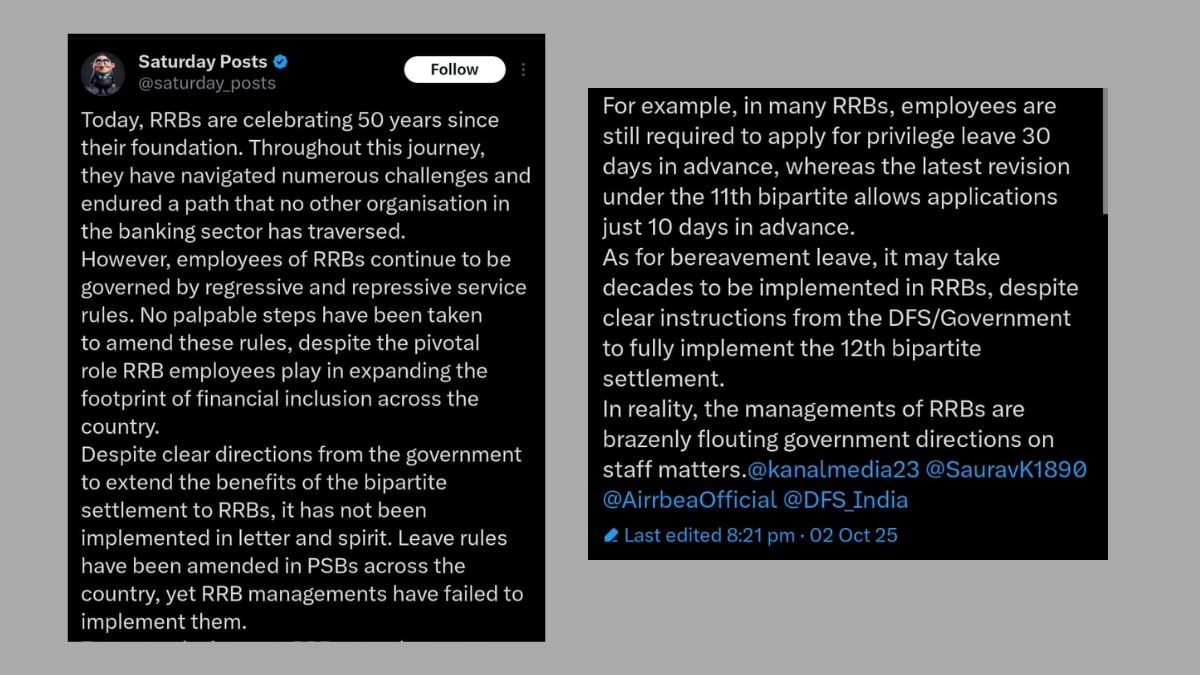50 Years of RRBs: Uneven Implementation and Unresolved Leave Rule Disparities
On the 50th year completion of Regional Rural Banks, employees highlight that leave rules last updated in 2010 remain unchanged despite multiple bipartite revisions improving Public Sector Banks staff welfare.

Author: Neha Bodke
Published: October 16, 2025
Regional Rural Banks (RRBs) across the country are observing 50 years since their establishment. Formed in 1975 to extend banking services to rural India, RRBs have played a crucial role in promoting financial inclusion and supporting rural and agricultural developments.
However, as the sector marks this milestone, employees continue to point to long-pending disparities in service conditions, particularly in the area of leave rules which remain governed by the Regional Rural Banks (Officers and Employees) Service Regulations, 2010.
Leave Rules: Outdated Framework, Uneven Implementation
While the leave rules in public sector banks (PSBs) are revised periodically through Bipartite Settlements, RRBs continue to operate under service regulations last amended 15 years ago. The difference has created a visible policy gap between the two sectors.
An anonymous officer from RRB explained, “Actually, the issue of leave disparity arises because every Bipartite Settlement that applies to the banking industry is, by the NIT Award, applicable to RRBs as well. But in our case, the implementation happens much later. Salary revisions get approved, but the leave rule amendments require Government of India approval, which delays or sometimes halts the process.”
The officer further added “Under the 11th Bipartite Settlement, the notice period for availing Privilege Leave was reduced to 10 days, replacing the earlier 30-day requirement. Further, the 12th Bipartite Settlement waived even this advance notice for registered trade union office bearers. Yet, in most RRBs, the older provision requiring one month’s notice remains unchanged.”
“In many RRBs, the rule still requires 30 days’ advance notice for privilege leave,” said another employee. “If any urgent situation arises, we have to give written explanations for why we couldn’t plan earlier. A 10-day rule, as in PSBs, would remove that unnecessary justification and make the process humane.”
Image: An ‘X’ account explaining the same leave disparity issue.
“The leave rules in RRBs are still those framed in 2010,” said Samiran Medhi, General Secretary of the National Federation of RRB Employees (NFRRBE). “Subsequent Bipartite Settlements have brought major improvements in PSBs aimed at better work-life balance, but these have not been implemented in RRBs.”
Maternity and Related Leave Provisions
The disparity is particularly evident in the case of maternity and family-related leave provisions. Under existing RRB rules, female employees are entitled to six months’ maternity leave at a time, subject to a lifetime cap of 12 months.
In contrast, the 12th Bipartite Settlement extended maternity benefits in PSBs to include:
-Up to 12 months of maternity leave, including for multiple births.
-Special maternity leave of 60 days in cases of stillbirth or infant death within 28 days.
-Nine months’ adoption leave for legally adopting a child below one year of age.
-Leave for IVF treatment, within the overall 12-month limit.
An officer pointed out, “Women employees are affected the most. Family obligations or child-care needs can’t always be planned 30 days in advance. Even sabbatical leave, allowed in PSBs for up to three months for family or child-care reasons, has not been implemented in many RRBs, despite DFS directions.
“This disparity also affects women employees the most. The new provisions for maternity, adoption, and medical support have made PSB policies more inclusive, but RRB employees continue to be deprived of such welfare measures.” Medhi added.
Bereavement and Other Leave Provisions
The 12th Bipartite Settlement also introduced bereavement leave in PSBs for the loss of immediate family members like spouse, parents, children, or parents-in-law, to be availed within 15 days of the demise. The RRB regulations currently contain no such clause, requiring employees to use privilege or casual leave in such circumstances.
Other updated provisions including special casual leave during natural calamities, leave for defence representatives in departmental proceedings, and monthly sick leave relaxation for women employees remain unadopted in RRBs.
Another employee explained, “Bereavement leave means that in case of a death in the family, spouse, parents, or children, the employee can take time off to mourn. This provision exists in PSBs under the 12th Bipartite, but it is yet to be implemented in RRBs.”
Need for Policy Alignment
According to AIRRBEA, the absence of updates has broader implications for staff morale and retention. “In the interest of ensuring a better work-life balance and enhancing the overall productivity and morale of RRB employees, it is imperative that the leave rules in RRBs be updated and implemented at par with those prevailing in PSBs,” Medhi said.
He further stated, “On behalf of AIRRBEA, we are seriously pursuing the matter with the Government of India for the early updation of leave rules in RRBs at par with those applicable in PSBs.”
A Continuing Process
While the Department of Financial Services (DFS) has from time to time directed that bipartite benefits be extended to RRBs, implementation has been inconsistent. The call for parity, raised repeatedly by employee federations, underscores the need for a uniform approach across the banking sector.
As RRBs complete 50 years of service to rural India, the employees who form their foundation hope that long-pending reforms in staff welfare and leave entitlements will finally receive due attention.
Advertisement
No comments yet.
